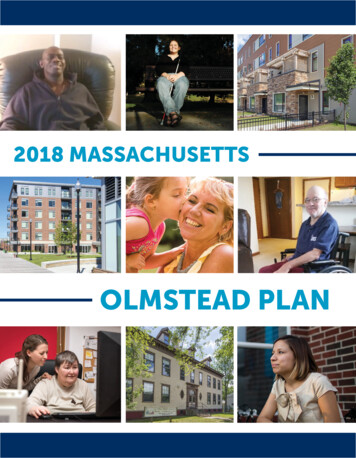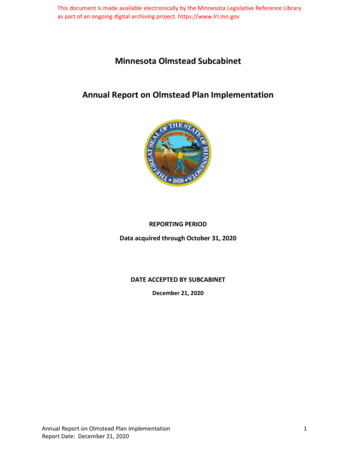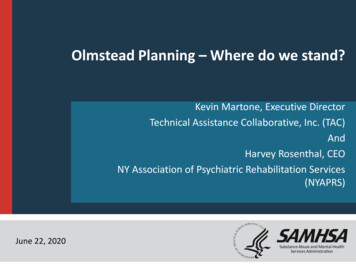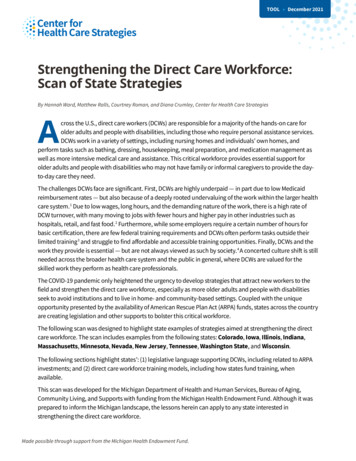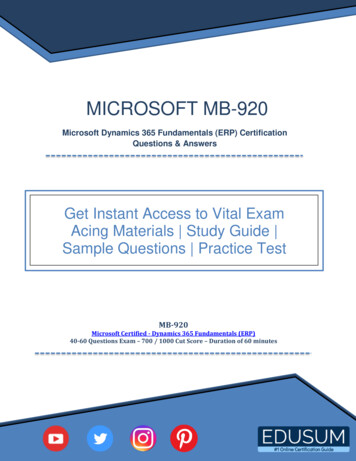
Transcription
OLMSTEAD PLANNING PROCESS:Describe how stakeholders were involved in the development of the Plan.Since 2006, Beaver County has been working to develop a countywide System of Care (SOC)utilizing both the Substance Abuse and Mental Health Services SOC philosophy for child-servingsystems and the Comprehensive, Continuous, Integrated System of Care (CCISC) process(Minkoff & Cline, 2004, 2005). CCISC is a vision-driven system “transformation” process forre-designing behavioral health and community supports to be more about the needs of theindividuals and families needing services. Beaver County is also one of the five counties thatworked to close Mayview State Hospital. The closure was completed in 2008 and the county hasnot used a state psychiatric hospital bed since that time, with the exception of a few individualssent by the local jail for evaluation at the Torrence Forensic Unit.Beaver County developed the Management Structure below to oversee SOC development.Beaver County has a Leadership Team and a Steering Committee, as well as severalsubcommittees. All committees strive for a composition in which 51% of the members have livedexperience in behavioral health, trauma, homelessness or poverty. The Leadership Teammembership includes county staff, along with Steering Committee and subcommittee chairs. TheSteering Committee and the subcommittees are comprised of individuals who receive services,families, change agents, and providers. The County Planning Team and SOC Steering Committeework together on the development of a countywide plan and discuss the expenditure of funds.The Steering Committee takes a lead role in gathering stakeholder input and planning the publichearings. County human service department directors (Behavioral Health, Children and YouthServices, Office on Aging and Community Development) attend at least one Steering Committee.The Leadership and Steering Committees host two public hearings a year, as one way to gainstakeholder input. This year, the public hearings were June 27 and June 30, 2016, respectively.In addition to the public hearings, a survey is circulated to the stakeholder community to obtaintheir input on the development of recovery-oriented services. This survey can be completed onlineor with pen and paper. A copy was emailed to the SOC distribution list, along with the instructionsfor online submission. Paper copies of the survey were available at each public hearing.
Beaver County has a comprehensive quality management (QM) structure facilitated byValue Options, the Administrative Service Organization, to assure the successful implementationof HealthChoices. In Beaver County, families and peers comprise 51% of the QM committee. Inaddition to measures established by the state, County specific performance outcomes are addedeach year. Findings from the Consumer/Family Satisfaction Teams, Incident Managementreports, and Transformation Priorities are also reviewed by this committee. FACT sheets are alsopresented quarterly to provide updates on SOC initiatives.Beaver County Behavioral Health (BCBH) also has a SOC Evaluation/Quality Improvement (EQI)committee that meets every other month to review data collected, which is related to the variousareas included in the plan. Several sources of secondary data are used to create reports that arereviewed by the EQI committee. Examples include: the results of Justice/Behavioral HealthCollaboration, fidelity assessments of specific Evidence-Based Programs (EBPs), the percentageof individuals with lived experience participating in the SOC, and use of both the electronic serviceplan (eSP) and the crisis plan. Service utilization, outcome data, and client satisfaction areconsidered. This information is used to generate discussion about needed system redesign orservice development.In addition to the SOC leadership and committee structures mentioned above, the Beaver CountySOC also conducts a monthly operational coordination and communication partner meetingfocusing on adult services. Convened at a Housing Authority facility in Aliquippa, PA, this regularpartner meeting allows community partners and stakeholders to meet and review coordination ofcare activities for behavioral health, criminal justice, housing, and homeless initiatives. Partnersinclude service providers, the Housing Authority of Beaver County, faith-based organizations,educational and vocational rehabilitation providers, peers, county administration, and an eligibilityspecialist from the behavioral health managed care organization that serves Beaver County.Housing needs within the County are a standing agenda item at this meeting. Needs identifiedthrough discussion at this meeting inform the County planning process, which includes Olmsteadplanning. A similar meeting occurs quarterly as part of a children’s system of care expansiongrant and there is a local collation meeting in the Aliquippa School District implementing a DrugFree Communities grant. All system of care efforts are aimed at building stakeholder collaborationand improving community supports.Beaver County also has a strong focus on Behavioral Health and Justice System Collaboration.Efforts have been underway since 2000 to develop services and supports for individuals withbehavioral health needs, who are involved in the justice system. This began with theestablishment of a licensed mental health outpatient clinic in the then new county jail. Since thattime, jail-based and community-based reentry supports have expanded and improved, using theSequential Intercept Model (SIM) as the strategic planning framework. The County has a CriminalJustice Advisory Board (CJAB), currently chaired by the BCBH Administrator.This committee includes a County commissioner, the director of juvenile probation, the sheriff, thehousing authority, a chief of police, the victim’s advocate, a representative from State Probationand Parole, the Single County Authority for Drug and Alcohol Services, the Medical Director ofValue Options, the behavioral health managed care committee, a Penn State college professorfrom the forensic program, a behavioral health provider and a representative of the PennsylvaniaCommission on Crime and Delinquency. There is a SIM subcommittee to the CJAB.This SIM subcommittee includes individuals with lived experience. These groups of the localdecision makers is integral to monitoring system progress and updating improvement plans.II. SERVICES TO BE DEVELOPED:
Please address each of the following services, including the number of individualsexpected to be served, projected timeline for service development, and resources needed:a) Beaver County has an array of prevention and early intervention services. Operated byUPMC-WPIC, the county Crisis Center provides mobile, phone, and walk-in crisissupport. Additional crisis teams are operated by Pressley Ridge.These teams support children and families, including children involved in the Child Welfareand Juvenile Probation systems. Prevention and intervention services are also provided bycase management and family-based providers for individuals receiving thoseservices. Beaver County is currently conducting a review of its crisis system. Currently, themajority of services delivered by the Crisis Center are walk-in and phone crisis support. Areasof enhancement under consideration include expanding services to support additional mobileresponse and crisis stabilization provided by the Crisis Center, as well as developing spacewithin the Crisis Center to support observation/stabilization capacity for up to 23 hours.oooNumber served: The county Crisis Center serves approximately 600 individualsannually. This number encompasses all age groups.Timeline: The review of the crisis system is expected to be completed in the firstquarter of 2017. Recommendations and related service development will followand last throughout 2017.No additional resources are needed at this time. Medicaid reinvestment will beutilizedb) Non-institutional housing options, with a focus on independent and shared livingarrangements. Identify existing “Housing First” approaches and discuss plans to developfuture approaches.b.1) BCBH has contracts with two provider agencies for supported housing units. Some arestaffed 24/7 and some are staffed part-time. See the following attached documents for detailson existing housing options (independent and shared living): Beaver County Behavioral Health (BCBH) Housing Inventory 1116 Current Beaver County Housing Inventory Availability 10/2016, distributed at theHousing and Homeless Coalition of Beaver County (HHCBC) meetings on a monthlybasis PA Housing Search Listing as of 11/22/2016b.2.) BCBH has an OMHSAS approved permanent supportive housing plan, which operatesunder a Housing First Model approach and provides for a Housing Supports Coordinator toassist individuals with locating, securing and maintaining safe, affordable permanent housing.Also included is funding for tenant-based rental subsidies and capital development funds toincrease local housing stock.c) Non-residential treatment services and community supports, including mobiletreatment options.See attached document titled Essential Services in a Recovery-Oriented System for theexisting service array.c.1.) Drug and Alcohol Intensive Case Management is a new non-institutional treatmentservice for individuals, age 18 and older.
oooNumber served: Drug and Alcohol Case Management can serve up to 125individuals. The service became operational approximately one month ago andcurrently serves 16 individualsTimeline: This was started as a reinvestment service and will be sustained throughbilling to HealthChoices within twelve monthsResources: The County would like to develop additional outpatient capacityc.2) Transition-age Psychiatric Rehabilitation is a new non-institutional treatment servicefor individuals, age 16 through 26.o Number served: Transition-age Psychiatric Rehabilitation is serving approximately20 individuals a yearo Timeline: This service started within the last 12 months, as part of a SOC granto No additional resources are needed at this time, as grant funding existsd) Peer support and peer-run services (examples: certified peer specialists, wellness andrecovery programs, drop-in centers, warm lines, etc.) for individuals, age 16 and older. Beaver County has two approved providers of Certified Peer Services. One is a stand alone program at the Mental Health Association (MHA). The second is located at BeaverCounty Rehabilitation Center (BCRC) and connected to Psychiatric Rehabilitation andSupported Employment. There are also peers working in Crisis Services and both LongTerm Structured Residences,o Number served: Approximately 50 people were served by BCRC last yearo Timeline: BCRC is operational. The MHA received their Promise ID the week of11/1/16 and plans to provide HealthChoices billable services early in 2017o No additional resources are needed at this time. HealthChoices, base funding andgrant funding are meeting the current need. All requests for services are met in atimely manner. Beaver County has a grant funded Certified Recovery Specialist Program. TheSupplemental Service Description was just approved and the Promise ID is inprocess. The provider is close to having some staff take the exam.o Number served: During the first two years of the grant, 138 individuals wereservedo Timeline: The provider hopes to be providing HealthChoices billable servicesearly in 2017o No additional resources are needed at this time. HealthChoices, base funding andgrant funding are meeting the current need. All requests for services are met in atimely manner. One peer program at the MHA is a Health and Wellness Coach that connects withindividuals, while they are on the Inpatient Unit. This is currently funded through aStaunton Farm Foundation award.o Number served: 10 since referrals began in September 2016o Timeline: The provider hopes to be providing HealthChoices billable servicesearly in 2017o No additional resources are needed at this time. HealthChoices, base funding andgrant funding are meeting the current need. All requests for services are met in atimely manner. The MHA operates a Warm Line and a drop-in center. Both are staffed by peers.o Number served: 294 unduplicated callers for a total of 13,200 callso Timeline: This program is fully operational
o No additional resources are needed at this time. HealthChoices, base funding andgrant funding are meeting the current need. All requests for services are met in atimely manner.BCBH, the administrative office, employs a Recovery Specialist to work with adults, age18 and older, and a Youth/Family Engagement Specialist to connect with youth andfamilies of any age.o Number served: Between October 2015 and September 2016, nearly 700 youthand family members were reached through 45 networking activities and contactevents, including a town hall meeting, planning meetings, Youth Community Day,and an ice cream social. The family coordinator also engaged 45 individuals andfamilies through email, telephone, and face-to-face contact in order tocommunicate available services and supports. Throughout the year, the familycoordinator was able to recruit and/or engage 10 youth and family members toserve on SOC subcommittees or to participate in SCORES related activities.o Timeline: The service has been in place since 2008, when Mayview State Hospitalclosedo No additional resources are needed at this time. Base funding and grant fundingare meeting the current need. All requests for services are met in a timely manner.e) Supported Employment Services for individuals, age 18 and older.o Number served: 146 individuals were served in the last fiscal yearo Timeline: This service is in operationo No additional resources are needed at this time. HealthChoices, base funding andgrant funding are meeting the current need. All requests for services are met in atimely manner.III. HOUSING IN INTEGRATED SETTINGS:a) Complete a “housing inventory” of existing housing options available to individuals (pleasenote that available services may be located in other counties) Beaver County Behavioral Health (BCBH) Housing Inventory 1116. Current Beaver County Housing Inventory Availability 10/2016, distributed at the HHCBCmeetings on a monthly basis. Please see attached document titled Current Beaver CountyHousing Inventory Availability for details on the number of units in each program. Themajority of these programs are funded through Beaver County’s HUD COC grant. PA Housing Search Listing as of 11/22/2016. Supported Housing for females: there are two homes, each with a capacity to serve 3individuals. Supported Housing for males: 1 unit with the capacity for 3 individuals and staffed 24/7; 1unit with the capacity to serve 3 individuals and staffed part-time. Two units have been developed under the Permanent Supportive Housing (PSH) plan withreinvestment funds: a one bedroom apartment and a two bedroom unit. There are currently 15 individuals being supported by the BCBH Bridge Subsidy program. Housing Authority of the County of Beaver currently is responsible for 639 Housing ChoiceVouchers and 2,304 low rent units.b) Discuss the progress made towards integration of housing services as described inTitle II of the Americans with Disabilities Act (ADA).Beaver County’s approved PSH plan has been the primary driver in how the county developedPSH options. The housing available on both lists are scattered sites located within their chosencommunities with access to community/natural supports, services, employment, shopping andother amenities
Some are supported programs with onsite staff; the others are supportive programs, in which atenant can opt to have services or not. Individuals living in the supported programs with onsitestaff were offered the opportunity to choose that level of support in their housing, but eachindividual holds their own lease with the landlord.c) Describe the plans for Community Residential Rehabilitation (CRR) conversion. Beaver County has only 20 total Community Residential Rehabilitation (CRR) beds andno plans, at present, to further reduce that number.d) Describe strategies used to maximize resources to meet the housing needs of individualsincluding:1. Identifying the Local Lead Agency (LLA) and any agreement with the LLA forreferrals and supportive services arrangements.The Senior Tax Credit Manager/Help House Shelter Director, employed by the PHA is theidentified Local Lead Agency (LLA) for Beaver County. BCBH worked with Jonathan McVey(Executive Housing Coordinator, DHS), Ben Laudermilch (DHS Executive Housing Director),Brian Yaworski (HACB Executive Director) and Ashley Mancine, Regional Housing Coordinator,(RHC) to facilitate the transition of the LLA duties from BCBH to the Housing Authority of BeaverCounty in December 2016. The new LLA, Lisa Kessler, and RHC, Ashley Mancine, havecoordinated the initial stakeholder meeting for March 10, 2017. The LLA is also in the process ofdeveloping MOU’s with other stakeholders within the county. The individual already hascollaborative working relationships with the social service and community support agencies withinthe county through active participation on the HHCBC, as well as providing housing supports toindividuals referred to the Community Assisted Residential Living Program funded through theHousing and Urban Development Continuum of Care (HUD COC).2. Describing existing partnerships with local Public Housing Authorities, Regional HousingCoordinators, Community, Housing, and Redevelopment Authorities, and Local HousingOptions Teams including any specific referral and/or management Memorandums ofUnderstandings or other agreements.BCBH has always had positive working relationships with the HACB. Currently, BCBH has severalcontracts with HACB, which include the administration of the Bridge Subsidy Program throughthe OMHSAS approved PSH Plan and the Housing Outreach Specialist. As stated previously,BCBH is actively collaborating with the RHC to assist with the LLA implementation process. Therehas been a longstanding positive partnership with the RHC through the HHCBC, as well as theWestern Region Housing Options Coalition, which BCBH has actively participated in. BCBH alsohas a current contract with the local redevelopment authority to administer its capital developmentfunding under the OMHSAS approved PSH plan. The BCBH Administrator sits on the CoCSteering Committee, as well.IV. SPECIAL POPULATIONS:Discuss how the following groups of individuals with serious mental illness and their specializedservice needs are met:a) Individuals with a dual diagnosis (mental health/intellectual disability) Beaver County was the lead county in the development of Community HealthConnections, the Health Care Quality Unit (HCQU) located in Butler. BCBH participatesin the HCQU Management Oversight Committee.
Through the Community Support Plan process at Mayview, BCBH has been successful inutilizing services and supports from the ID system for individuals, who do not technicallyqualify for that system, but are benefiting from the approach and the expertise available.As part of BCBH’s internal QI process, cases of individuals receiving services from boththe mental health and the ID system are reviewed.BCBH participates in the Positive Practice Committee described in the ID section of thisplan.BCBH now has a regional Dual Diagnosis Treatment Team, which is a voluntary,community-based, direct service that provides intensive supports with a primary focus oncrisis intervention, hospital diversion, and community stabilization to individuals with a cooccurring ID/MH diagnosis.This is achieved through the delivery of integrated case management, medicationmonitoring/management, behavioral assessment, and the development andimplementation of comprehensive behavioral support plans.In the past year, both Beaver County LTSRs (Friendship Ridge LTSR and NHS LTSR)have served clients dually diagnosed (MH/ID).b) Individuals with co-occurring disorders (mental health/substance use disorders) Beaver County has been working since 2001 to develop a SOC welcoming to individualswith a co-occurring mental health and substance use disorder (COD), who are involved inthe forensic system. Progress is measured through tools found in the CCISC model developed by Drs. Minkoffand Cline, who work as consultants with BCBH. All providers in Beaver County assess for a COD. BCBH offers the 10 part COD training series and Motivational Interviewing annually. BCBH is about to offer a case management service that will follow individuals with asubstance use only and a COD.c) Individuals with both behavioral health and physical health needs BCBH works closely with the local nursing home, as well as the Office on Aging. BCBH provides financial support to a chore service that helps individuals with physicalhealth needs remain in their own home. BCBH provides financial support to Homemaker/Home Health to offer personal assistanceand help with housekeeping for individuals with physical health needs, so they can remainin their own home. Primary Health Network, a Federally Qualified Health Center (FQHC) provides integratedphysical and behavioral health care and has three locations in the county.d) Individuals with a traumatic brain injury The Beaver Valley Intermediate Unit offers the Brain Steps School Re-Entry Program tochildren with brain injuries, ranging from mild concussions to traumatic brain injuries (TBI).Acquired Brain Injury Network of Pennsylvania, Inc. – 1-800-516-8052. They also have anInfoLine that is staffed completely by trained volunteers who provide support, compassion,and information specific to the needs of the individual callers.PA Independent Enrollment Broker – 1-877-550-4227. This is the Independent Waiver,which includes anyone with a brain injury needing help in their home.e) Individuals with criminal justice/juvenile justice history Since 2001, BCBH has funded COD treatment and re-entry services in the county jail. BCBH also provides COD assessments in the courthouse and Global Appraisal ofIndividual Need (GAIN) screens in the Regional Booking Center.
Beaver County is one of seven programs selected to participate in a national evaluationof the Second Chance Act (SCA) conducted by the Department of Justice. The aim ofthe SCA is to reduce recidivism by providing re-entry services in the jail and in thecommunity. Recidivism data from 2011 through 2014 shows approximately a 20%reduction in re-incarceration.Beaver County presented a poster summarizing SOC and Criminal Justice Partnershipsat the National Council’s 2016 national conference.Beaver County makes contact with State Correctional Institutes, when an individual isidentified on the Final Discharge Maximum Expiration (FDME) report. This report listsinmates receiving active mental health treatment or monitoring, and also contains themaximum sentence date for each inmate.BCBH participates in the County’s Criminal Justice Advisory Board (CJAB) and helped tocomplete its strategic plan. The Sequential Intercept Model is part of the comprehensivestrategic plan. The BCBH Administrator is the current chair of the CJAB.Beaver County has an Assertive Community Treatment team with a strong forensiccomponent.Mental Health First Aid training is being offered to local law enforcement, probation/parole,911 dispatchers, Emergency Medical Services (EMS), and other first responders.Vocational services are provided in the jail and there is community follow up. There is aspecial work release program for women.The county has a sponsor program in which two faith-based organizations train andsupervise individuals, who mentor released offenders.Another faith-based organization offers a Future Anticipated Cohort for youth, who havea parent in the justice system.Certified Peer Specialists and Recovery Specialists work with this population.The county oversees the SOC Partner Meeting made up of county, probation, treatment,re-entry, vocational and faith-based providers, who meet monthly to discuss issues relatedto the provision of services to individuals with a behavioral health diagnosis who areinvolved in the justice system.Specialized probation teams have been established and consist of a probation officer, acase manager and a person with lived experience.Beaver County is considering a diversion program that will offer assessment, support andtreatment at the preliminary hearing for individuals arrested for an ungraded Misdemeanoror a Misdemeanor 3 with a behavioral health component.f) Individuals who are deaf or hearing impaired Beaver County subcontracts with Steel City Interpreting, who routinely providesinterpreting services for people with hearing impairments. They accompany individuals toservice providers, including, but not limited to, doctors, dentists, college classes, and casemanagement appointments. Many of the providers have TTY machines and all providers have access to the TelephoneRelay Service. Sign language classes are available to the public. The County has a Language AccessCoordinator for the provision of language access services within the legal system. The County has identified a professional interpreting and translating company, who iswilling to provide professional interpreting, translating, and cross-cultural consulting. The Human Service Departments are planning Culturally and Linguistically AppropriateServices training in 2017g) Individuals who are experiencing homelessness Beaver County continues to support and provide services to homeless individuals andfamilies through its COC initiatives addressed in the HUD mandate.
Since the late 1990s, HHCBC, which includes a Homeless Task Force, has met under theleadership of the Beaver County Community Development Office. The HHCBC iscomprised of over 100 members from over 50 agencies and meets monthly to address theneed and provide affordable, sustainable housing with the goal to end homelessness inBeaver County.The Cornerstone, a suite of centrally located offices, provides a single point of entry intomost of the continuum of care’s homeless assistance programs using a coordinatedassessment.Since 2009, BCBH has had a permanent supportive housing program targeted toindividuals diagnosed with serious, persistent mental illness. The program is designed toassist individuals in accessing and maintaining safe, affordable, permanent housing withinthe community by providing Housing Supports Coordination, funding for Bridge Subsidiesuntil access to Section 8 vouchers is available, and funding to increase available housingstock.In 2014, funding was set aside from the housing block grant for a homeless outreachcoordinator to oversee one of the HUD funded permanent supportive housing programsdesigned to assist disabled households residing in shelters or places not meant for humanhabitation.Beaver County received a 2016 Department of Health and Human Services (DHHS),Substance Abuse and Mental Health Services Administration (SAMHSA) Grant –Cooperative Agreements to Benefit Homeless Individuals (Short Title: CABHI).Beaver County Children and Youth Services operates an Emergency Housing Programfor active clients. The agency leases apartments/houses from the HACB and providesintensive case management services to families, while they reside in the properties. Theprogram began 8 years ago with one property and expanded to 14 properties, as of July2016. The program has been part of the agency’s strategy to safely reduce the numberof children entering foster care. In FY 2015-2016, the program served 24 families and 63children.h) Older adults BCBH works closely with Beaver County Office on Aging (BCOA). BCBH is a Core partnerfor the BeaverLINK. BeaverLINK is the Aging and Disabilities Resource Collaborative(ADRC) serving Beaver County residents. The Deputy Administrator is a voting memberof the LINK. BCBH and BCOA work cooperatively with the Emergency Operation (911) Center toassure information needed for disaster drills is comprehensive and current. BCBH and BCOA jointly attend Risk Management meetings facilitated by the Departmentof Human Services / Bureau of Human Services / Adult Residential Licensing. BCBH and BCOA collaborate on individual cases and have worked well with ProtectiveServices. BCOA participates in SOC activities. BCOA has a provider trained in Mental Health First Aid (MHFA) in order to promote theCounty’s goal of Mental Health Literacy across the Lifespan. MHFA trainings will begin forBCOA staff in 2017. One of the two public hearings is held at a senior center. BCBH and BCOA participate collaboratively in a “Cross Systems Collaboration TechnicalAssistance Call” to review cases with other PA counties via teleconference. Approachesand resources are compared and developed to best address the individual cases beingpresented. BCBH and BCOA collaboratively attend/monitor Beaver County personal care homelicensing visits/exits conducted by the PA Bureau of Human Services and Licensing. BCBH and BCOA jointly fund in-home services to allow the elderly to age in place.
i) Individuals who are medically fragile BCBH works closely with the local nursing home Case management staff connect with the physical health plans and their special needscare coordinator BCBH has contracts to provide in-home personal care assistance and home makingservices BCBH, through the Office on Aging, funds core services to help with home modificationsj) Individuals with limited English proficiency The County has identified a professional interpreting and translating company, who iswilling to provide professional interpreting, translating, and cross-cultural consulting. BCBH provider contract began to require in 2016 a formal commitment to achieve Culturaland Linguistic Competence (CLC) as evidenced by a CLC plan, staff atten
worked to close Mayview State Hospital. The closure was completed in 2008 and the county has not used a state psychiatric hospital bed since that timewith the exception of a few individuals , sent by the local jail for evaluation at the Torrence Forensic Unit. Beaver County developed the Management Structure below to oversee SOC development.
